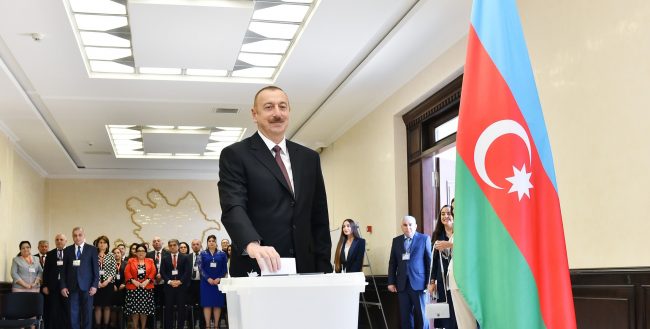Aliyev wins 4th presidential term in election plagued by ‘serious violations’


 Ilham Aliyev is to serve a fourth presidential term in Azerbaijan, with the Central Election Commission announcing he received 86% of votes in Wednesday’s snap election. The opposition-leaning Meydan TV reported major violations, airing footage of people voting multiple times at different polling stations. International observers said the election ‘lacked genuine competition’, and reported ‘serious violations’ including ballot-box stuffing.
Ilham Aliyev is to serve a fourth presidential term in Azerbaijan, with the Central Election Commission announcing he received 86% of votes in Wednesday’s snap election. The opposition-leaning Meydan TV reported major violations, airing footage of people voting multiple times at different polling stations. International observers said the election ‘lacked genuine competition’, and reported ‘serious violations’ including ballot-box stuffing.
Preliminary results from the Central Election Commission put turnout at 75%, with second place candidate Zahid Oruj reportedly receiving just 3% of the vote.
The election gave Aliyev seven more years as president, after constitutional changes last year extended presidential terms. Most of the country’s opposition parties boycotted the election due to what they called a ‘non-competitive environment’. International observers also pointed to ‘a restrictive political and legal environment’ reducing genuine competition.
Jamil Hasanli, chairman of the opposition National Council of Democratic Forces, told OC Media in February that there could be no free elections in Azerbaijan. ‘The independent media was destroyed; civil society institutions have collapsed […] the collapse of these institutions was part of the Azerbaijani government’s election strategy’, he said.
[Read on OC Media: Azerbaijan’s snap election: an election ‘without the headache’]
‘Serious violations’
Preliminary findings from OSCE election monitors on Wednesday pointed to several ‘serious violations’. These included ballot-box stuffing, ‘seemingly identical’ signatures on voter lists, as well as group, proxy, and multiple voting. ‘Procedures related to inking, a safeguard against multiple voting, were frequently disregarded’ the report said.
In a statement on Thursday, the OSCE said more than half the vote counts were assessed negatively, largely due to ‘deliberate falsifications’ and an ‘obvious disregard for procedures’.
#Azerbaijan election lacked genuine competition in an environment of curtailed rights and freedoms, international observers say ➡️https://t.co/7GTYpDR9jO #elections #azvote2018 pic.twitter.com/gou4IZtwZY
— OSCE/ODIHR (@osce_odihr) April 12, 2018
They said the ruling party’s campaign in favour of the incumbent was well-organised and well-resourced, while the campaigns of the other seven candidates were ‘limited’ and ‘appeared hampered by a lack of regional structures and resources’.
The OSCE said political campaigning had become harder since criminal defamation laws, with additional penalties for defamation of the president, had limited freedom of expression.
‘We have to consider that, in a political environment where democratic principles are compromised and the rule of law is not observed, fair and free elections are not possible’, said Viorel Riceard Badea, Head of the delegation from the Parliamentary Assembly of the Council of Europe.
On 11 April Meydan TV uploaded footage showing people voting several times at polling stations.
‘Restricted and confined political environment’
Arzu Geybulla, a prominent Azerbaijani journalist and political commentator, said that violations such as ballot-box stuffing and multiple voting have been common since Azerbaijan’s independence. This year was different, she said, in that this started to happen more openly.
Geybulla told OC Media that the other candidates in the election were ‘puppets’.
Akif Gurbanov, a former member of the Central Election Commission and head of the Institute for Democratic Initiatives, a local NGO, told OC Media in February that the authorities would only register candidates ‘who they control’.
The Modern Musavat Party’s candidate, Hafiz Hajiyev, voted for his opponent, Aliyev, in Binagadi’s 8th district, according to Meydan TV.
Geybulla said that had the opposition not boycotted the election and ‘by some miracle […] managed to get their candidates into the race, the lack of freedoms and the overall restricted and confined political environment in the country would have never let these candidates have a chance at winning because in the history of Azerbaijan’s elections starting in 1993 we have not seen free and fair elections’.
She said the political environment in Azerbaijan is unstable and unhealthy to an extent where ‘it functions based on the interests of the ruling family and the people around it who have built Azerbaijan for themselves, and solely for their individual benefits’.
‘There are no structures left that can properly function, whether it is legal, judicial or any other. Economic indicators are often inflated, election results are inflated, education statistics are inflated, everything is inflated like you would inflate a bubble. In fact, Azerbaijan is a bubble and my concern is that the moment when it is going to burst’, Geybulla told OC Media.
The full preliminary results from the Central Election Commission gave Aliyev 86% of the vote, Zahid Oruj, Gudrat Hasanguliyev, and Sardar Jalaloghlu 3% each, Hafiz Hajiyev and Araz Alizada around 1.5% each, and Faraj Guliyev and Razi Nurullayev around 1% each.







